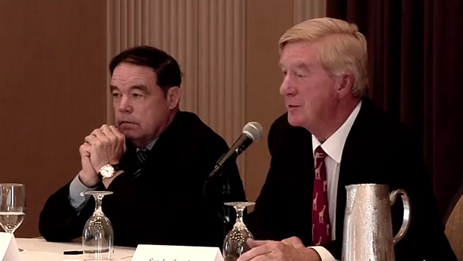Celebrating 20 Years of Education Reform in Massachusetts
Birmingham, Weld Oppose MA Adopting Common Core, Call for Lifting Charter School Caps
Pioneer forum celebrates 20th anniversary of education reform with Weld, Birmingham, and panel of contributors to Bay State’s historic reforms
Two of the three primary authors of Massachusetts’ landmark 1993 Education Reform Act questioned Massachusetts’ decision to jettison its academic standards in favor of national standards known as Common Core, and called on state leaders to lift the cap on charter public schools in the commonwealth’s lowest performing school districts at a June 20th forum to celebrate the 20th anniversary of the law’s signing.
Today, Pioneer is pleased to release a video of the forum, at which former Senate President Tom Birmingham and former Gov. Bill Weld delivered keynote addresses.
[youtube height=”HEIGHT” width=”WIDTH”]http://www.youtube.com/watch?v=-bkbDGhhTEo[/youtube]
[youtube height=”HEIGHT” width=”WIDTH”]http://www.youtube.com/watch?v=BKu2lLrHxcs[/youtube]
The event also included a panel with former Commissioner of Education Dave Driscoll, Gov. Weld’s former education advisor Mike Sentance, former high-ranking state Department of Education official and board of education member Sandra Stotsky, and Tripp Jones, who was chief of staff for Representative Mark Roosevelt, the Act’s third primary author.
[youtube height=”HEIGHT” width=”WIDTH”]http://www.youtube.com/watch?v=2rA-ktiESpk[/youtube]
The panel was moderated by Bellwether Education’s Sara Mead, who serves on the board of Democrats for Education Reform.
“I testified many times before the legislature and only once did I have the wind at my back in the hearing room,” Weld said. “[T]he topic was charter schools. There were huge cheers behind me, from 350 people… These were inner-city parents who understood that they and their kids were being robbed by the current system of education and charter schools offered them a way up and a way out.”
Weld added that “[w]e have a waiting list of 53,492 kids who want to get into charter schools and can’t because of the cap. Parents and kids are voting with their feet. We should respect that…”
Birmingham concurred, noting that the Senate version of the Education Reform Act, which he authored, included no cap on charter schools.
Driscoll said charters have “proven themselves. Enough already; it’s time to move on that issue.”
On academic standards, Birmingham said “The Patrick administration is in the process of jettisoning our tried and true reliance on MCAS and replacing it with unproven national tests and standards called Common Core. I fear… the political implementation of Common Core. If there is no strategy… to lift the lower-performing states up to the higher-performing ones, I’m afraid all the political vectors will push the bar down so everyone can clear it… That will be a lower standard than we have set in Massachusetts.”
Weld opposes Common Core’s focus on so-called informational texts rather than the classic literature that is the centerpiece of Massachusetts’ English standards. “Common Core proposes… that we cut back on useless appendages like Dickens and Wharton and Arthur Conan Doyle and Mark Twain in exchange for global awareness, media literacy, cross-cultural flexibility and adaptability… The Common Core approach looks to me like an apology for muddle-headed mediocrity.”
He added, “I wish we could hire that great law firm of Dickens, Doyle, Wharton and Twain to persuade current leaders of Massachusetts not to go down” that road.
Driscoll, a Common Core supporter, disagreed, saying that the national standards respond to employers’ concerns.
After the 1993 passage of education reform, state SAT scores rose for 13 consecutive years. In 2005, Massachusetts students became the first to score best in the nation in all grades and categories on the National Assessment of Educational Progress. They have since repeated the feat each time the tests have been administered. And while U.S. students lag their international peers, the commonwealth’s eighth graders tied for best in the world in science in the 2007 Trends in International Math and Science Study.
Birmingham said the “Education Reform Act can be reduced to two core principles: We will make a massive infusion of state money into public schools, and in return we expect high standards and accountability from all education stakeholders.” He compared the combination of adequate resources and standards and accountability to “two wheels of a bicycle. If you removed one, we couldn’t move forward.”
He outlined his thoughts about the progress of education reform in a recent Boston Globe op-ed.
Birmingham said he fears the state might be veering away from those two core principles, adding that “unless we continue to adhere to the core principles that explain much of our success, I am afraid we may squander that success. I sincerely hope I am wrong.”


